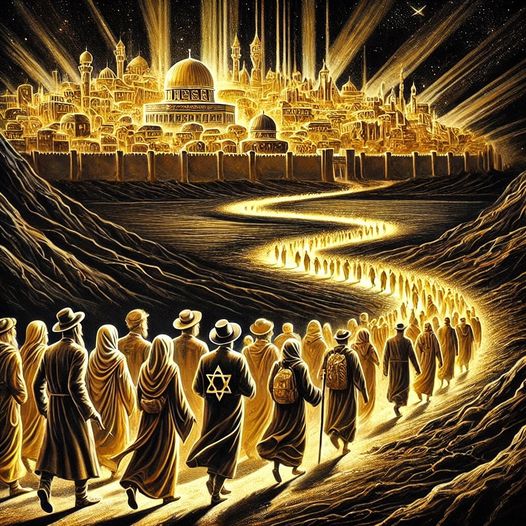Comparing Messianic Jewish and Protestant Faith
Salvation is a central theme in both Messianic Judaism and Protestant Christianity. Although these traditions share a belief in Yeshua (ישוע, Jesus) as the Messiah and Savior, their understandings of salvation—its nature, process, and implications—often differ. This blog post explores these distinctions and similarities, drawing from the Scriptures to illuminate the theological nuances of Messianic Jewish Salvation (ישועה משיחה) and Protestant Christian Salvation.
Defining Both in Contexts
Messianic Jewish is deeply rooted in the covenantal promises (ברית) of God (אלוהים) to Israel (ישראל). It emphasizes the fulfillment (מלאה) of the Torah (תורה) and the prophetic writings (נביאים) through Yeshua, who reconciles both Jews and Gentiles to God. Salvation is not just about individual redemption but also includes the restoration of Israel and the nations (Romans 11:25-27; Isaiah 49:6).

Protestant, on the other hand, primarily focuses on individual justification by faith alone (“sola fide”). This understanding is rooted in the Reformation and emphasizes personal faith in Jesus Christ as the sole means of being made right with God (Ephesians 2:8-9; Romans 10:9). The concept of “grace alone” (“sola gratia”) underscores the unmerited favor of God that grants salvation to sinners.
While both traditions affirm that salvation is a gift of God’s grace, their approaches to understanding and living out this salvation diverge in important ways.
The Role of the Torah
In Messianic Judaism, the Torah is central to understanding God’s plan of salvation. The Torah reveals God’s holiness (קדושה) and humanity’s need for atonement (כפרה). Messianic Jews believe that Yeshua fulfills (מלא) the Torah (Matthew 5:17) and that faith in Him does not abolish the Torah but establishes it (Romans 3:31). Observance of Torah commandments is often seen as a joyful response to God’s love and faithfulness.
For Protestants, the role of the Torah is often viewed through the lens of law and grace. The Torah is seen as a guide that points to humanity’s inability to achieve righteousness on their own (Galatians 3:24). Salvation, therefore, is not through the works of the law but through faith in Jesus Christ (Romans 3:20-22). Many Protestants interpret the Torah as having been fulfilled and completed in Christ, reducing its direct application to Christian life.
Example: Consider the practice of Sabbath (שבת) observance. Messianic Jews often continue to observe Shabbat as a sign of their covenant with God (Exodus 31:13), believing it is part of God’s eternal instructions. Protestants, however, may view Sabbath observance as optional or as a principle of spiritual rest fulfilled in Christ (Hebrews 4:9-10).
Covenant and Community
Messianic Jewish Salvation has a communal and covenantal aspect. The promises of salvation are understood within the framework of God’s covenant with Israel. This perspective emphasizes the collective redemption of Israel alongside the salvation of individuals. Romans 11:26 underscores this: “And so all Israel will be saved, as it is written: ‘The Deliverer will come from Zion; He will turn godlessness away from Jacob.’”
In Protestant thought, salvation is often more individualistic. While there is acknowledgment of the Church (“ekklesia”) as the body of Christ, the focus is on personal faith and repentance. John 3:16 encapsulates this idea: “For God so loved the world that He gave His one and only Son, that whoever believes in Him shall not perish but have eternal life.”
The Process
Messianic Jewish Perspective:
- Repentance (תשובה): Returning to God and His ways is foundational (Joel 2:12-13).
- Faith in Yeshua: Trusting in Yeshua as the promised Messiah (משיח) and the ultimate atonement for sin (Isaiah 53; John 1:29).
- Obedience to the Torah: Living out faith through obedience, not as a means of earning salvation but as a response to God’s covenantal love (Deuteronomy 6:5; James 2:17).
- Restoration of Israel: Understanding salvation as a part of God’s larger plan to restore the nation of Israel (Jeremiah 31:31-34).
Protestant Perspective:
- Faith: Salvation begins with faith in Jesus Christ—an acknowledgment of one’s sin and the acceptance of Jesus’ sacrificial death and resurrection (Romans 10:9-10).
- Justification: Through faith, believers are declared righteous before God (Romans 5:1). This act of justification is instantaneous and complete.
- Sanctification: A lifelong process of becoming more Christ-like, empowered by the Holy Spirit (2 Corinthians 3:18).
- Glorification: The ultimate goal of salvation, when believers are made perfect in the presence of God (Romans 8:30).
Example: The story of Abraham’s faith is pivotal in both traditions. Messianic Jews emphasize his obedience to God’s covenant (Genesis 17:9-10), while Protestants highlight his faith being credited as righteousness (Romans 4:3). These perspectives are not mutually exclusive but reflect different emphases.
The Goal
For Messianic Jews, the goal of salvation includes the restoration of Israel and the fulfillment of God’s promises to the Jewish people. This vision encompasses the establishment of God’s kingdom on earth, where Jews and Gentiles worship together (Zechariah 14:16; Revelation 7:9-10). Salvation is viewed as a holistic process that brings healing to individuals, communities, and nations.
Protestant theology often emphasizes eternal life in heaven as the primary goal of salvation. The focus is on a personal relationship with God through Jesus Christ, leading to eternal communion with Him (Philippians 3:20-21). While some Protestant traditions also emphasize the renewal of creation, the individual’s eternal destiny is typically given prominence.
Eschatological Perspectives
Messianic Jewish Salvation places significant emphasis on the end-times restoration of Israel. The belief that Yeshua’s return is tied to the Jewish people’s recognition of Him as Messiah (Matthew 23:39) shapes their eschatology. This perspective is informed by prophecies such as Ezekiel 37, which envisions the spiritual and physical revival of Israel.
Protestant views on eschatology vary widely, from premillennialism to amillennialism. However, many Protestants share the belief that salvation culminates in the return of Christ and the establishment of a new heaven and earth (Revelation 21:1-4). The focus is often on the Church’s role in God’s redemptive plan rather than Israel’s national restoration.
Despite these differences, Messianic Judaism and Protestant Christianity share foundational beliefs:
- Both affirm that salvation is by God’s grace (חסד) through faith in Yeshua.
- Both recognize the need for repentance and the transformative power of the Holy Spirit (רוח הקודש).
- Both anticipate the Messiah’s return and the fulfillment of God’s kingdom (מלכות).
Biblical Reflections
- Romans 11:17-18: Paul’s metaphor of the olive tree illustrates the interconnectedness of Jews and Gentiles in God’s redemptive plan. The branches of the olive tree represent the Jewish people, while the wild olive shoots represent Gentile believers who are grafted in.
- Ephesians 2:14-16: Yeshua’s sacrifice breaks down the dividing wall between Jews and Gentiles, creating one new humanity. This passage emphasizes unity in God’s plan of salvation.
- Isaiah 2:2-3: A prophetic vision of all nations coming to worship God, highlighting the unity envisioned in Messianic salvation and its ultimate fulfillment in the Messianic age.
Conclusion
Messianic Jewish Salvation and Protestant Christian Salvation reflect the richness and diversity of God’s redemptive work. While Messianic Judaism emphasizes the fulfillment of God’s covenant with Israel and the Torah’s enduring significance, Protestantism focuses on individual justification by faith and the transformative relationship with Christ. These perspectives are not contradictory but complementary, offering unique insights into the depth of God’s salvation plan.
By exploring these perspectives, believers can gain a deeper appreciation for the multifaceted nature of salvation and the shared hope found in Yeshua, the Messiah. As Paul writes in Romans 10:12-13, “For there is no difference between Jew and Gentile—the same Lord is Lord of all and richly blesses all who call on Him, for, ‘Everyone who calls on the name of the Lord will be saved.’”
Through understanding and mutual respect, Messianic Jews and Protestants can celebrate their shared faith in Yeshua while honoring their distinct traditions and callings.
Research for this post provided by our Hebraic Roots Study Bible.

